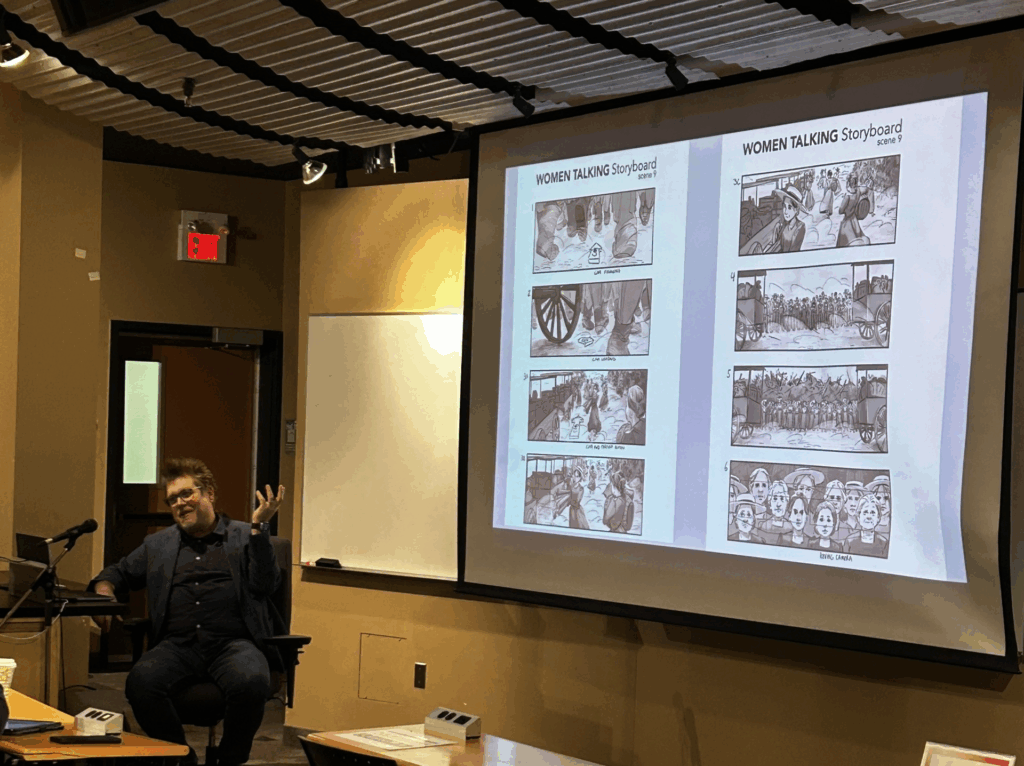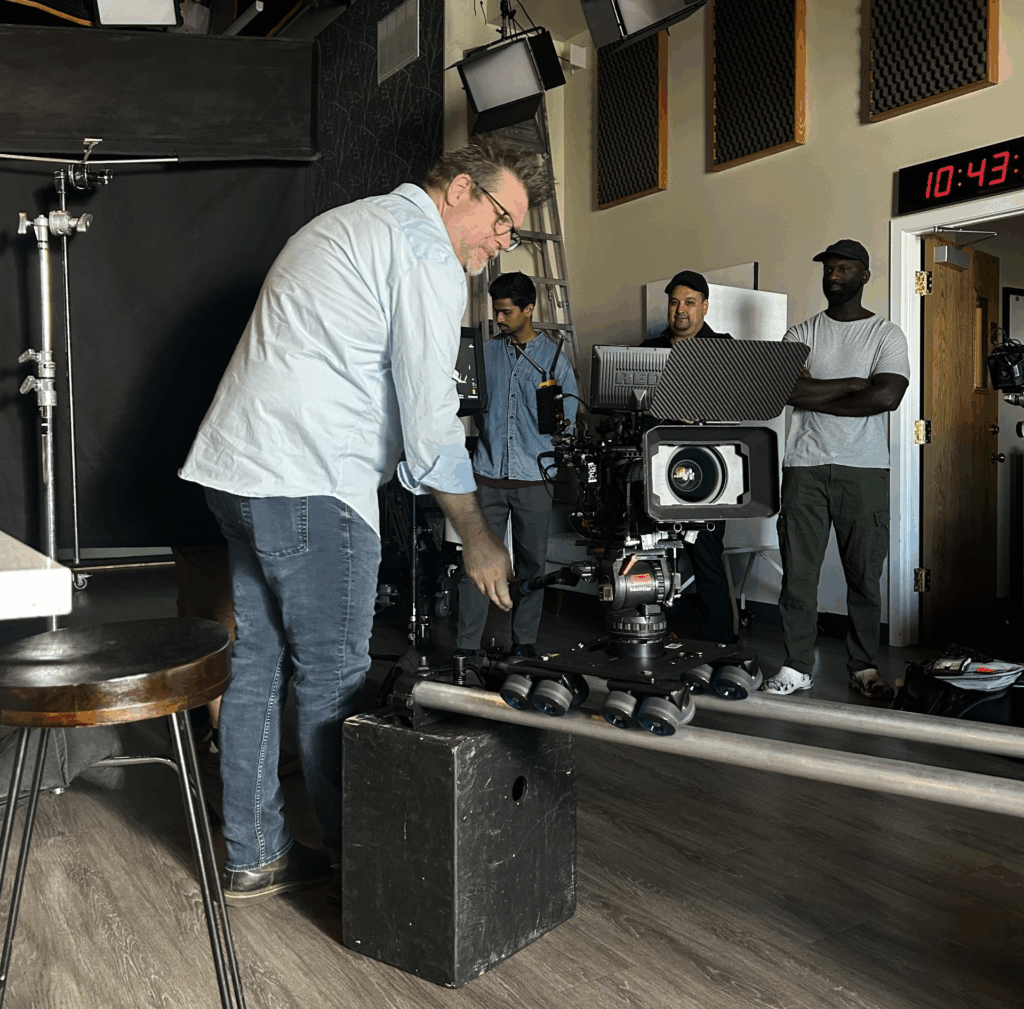
Film Training Manitoba (FTM) recently completed our latest Master Series on Cinematography with instructor Luc Montpellier, ASC, CSC, on June 28-29, 2025.
FTM’s Master Series programming is designed for high-calibre skills development, utilizing a range of training methods that feature a long-serving film professional delivering lectures, practical training sessions, and one-on-one sessions. Previous FTM Master Series programming has included sessions with Carl Gottlieb, Rory Kennedy, Mark Irwin, Mark Bailey, and William B. Davis.
Montpellier, ASC, CSC is an award-winning cinematographer with over 25 years of experience bringing to life visions of avant-garde directors such as Guy Maddin, auteur directors like longtime collaborator Sarah Polley and Clark Johnson, as well as the likes of Emmy-winning directors David Shore and Vince Gilligan.
Montpellier’s artistic direction for Women Talking was hailed as “timeless” by IndieWire, “haunting” and “full of emotion” by No Film School, and “elegant and evocative” by Cinematography World, earning him recognition from filmmakers and peers alike. This caught the eye of Academy Award winning producer, Peter Spears (Nomadland, and Call Me By Your Name) for his upcoming film adaptation of Shannon Pufah’s novel On Swift Horses directed by Daniel Minahan, starring Jacob Elordi, Daisy Egar-Jones and Will Poulter. The film will premiere at the 2024 Toronto International Film Festival.
“The opportunity to learn from Luc Montpellier ASC, CSC, provided an exceptional opportunity for the participants to explore our cinematographic practices with a true industry leader. Through creative, logistical and practical exercises, Luc led a class comprised of both seasoned and emerging cinematographers. It’s a rarity for cinematographers to have the opportunity to explore their practice together, and rarer still to do so with such prolific guidance.” Said Andrew Forbes, Associate CSC member.
“The session was yet another example of Film Training Manitoba’s dedication to excellence in training for Manitoba’s film industry technicians and creatives. Affording this opportunity took significant planning and coordination, and we are grateful for the efforts to support all levels of creative technicians.” He added.
Day One: Lecture + One-on-One Sessions
The series started with a two-hour lecture led by Montpellier that engaged attendees through his process from pre-production to post-production, with a focus on his work on the feature film, Women Talking, directed by Sarah Polley. This session was held at Red River College Polytechnic’s Canada Life lecture hall at the Roblin Centre in Winnipeg’s Exchange District.

Montpellier began the lecture by asking participants to introduce themselves and share what they hoped to learn during the training session. “FTM often builds in time to have our participants and instructors share with each other during our programming, which aids in creating an open learning environment.” Said FTM’s Training and Partnerships Manager Emily Labby.
Throughout the session, Montpellier shared a wide range of behind-the-scenes footage and clips from Sarah Polley’s Women Taking, and he highlighted the importance of camera tests, rehearsals, and advocating for yourself as a Director of Cinematography. He explained how he collaborated closely with Polley to visually tell such a powerful story, and how the extra prep time they had thanks to COVID-19 delays was a rare and valuable opportunity to further develop the project.

One of the most helpful teachings was his use of a “Creative Deck” to communicate their visual vision to the crew. Unlike a Pitch Deck, which is typically aimed to secure funding, a Creative Deck offers a visual representation of the film’s overall look and tone, as well as showing references, mood, and how certain scenes should feel on screen.
The lecture ended with an extended Q&A, where Montpellier ensured all the attendees questions were answered in full. Feedback from the lecture included the following comments:
- “Love a lecture where the host really loves their career.”
- “On target, creative, in-depth, extraordinary.”
- “I feel so inspired.”
Later that day, 11 of the course participants who signed up in advance had the opportunity to take part in separate 25-minute one-on-one sessions with Montpellier. These one-on-one coaching sessions allowed emerging and professional cinematographers and filmmakers to receive customized learning based on their own individual learning needs.

Montpellier’s coaching sessions were open, honest, and the feedback was calibrated to aid the participants in their creative and professional journeys. Comments from the one-on-one participant evaluations of the sessions included:
- “Lovely conversation and informative.”
- “I really liked hearing about his experience and perspective from his past projects.”
Day Two: Hands-On Cinematography course
The next day, the full-day cinematography course was held at FRANK Digital’s studio kitchen located at 509 Century Street.

Montpellier’s instruction started with a demonstration on how to position lighting to convey emotions within a scene. Since the chosen genre of the mock scene was drama, he emphasized that the lighting needed to reflect the tone and intensity of a dramatic moment. Once the lighting was set up, it was time to frame the shot. Using a Dana Dolly, Montpellier showed participants how camera movement and placement support emotion and narrative.

The second half of the course was focused on recreating scenes from Women Talking. Participants worked collaboratively to then light, frame, and shoot their interpretations of the scene. Montpellier allowed the participants to create a new camera and lighting setup with a recreation of the scene from Women Talking.
Once shots were filmed, the attendees gathered near the monitors to compare the results to the original shots from the film.

and footage from Women Taking
One of the attendees performed a colour pass on the footage, which then sparked Montpellier into a discussion on how he shot those scenes by using a pre-made LUT on his laptop.

To wrap up the practical session, Montpellier held another Q&A with the attendees for them to engage in learning more about cinematography. This Q&A led into an in-depth review on various camera bodies and lenses, to the future of AI in the film industry. Montpellier also shared what he’s working on next.

The participants’ evaluations from FTM’s Master Series were overwhelmingly positive, with 100% of participants revealing that the Master Series helped them in their current/future job and that they found the instructor knowledgeable, prepared and experienced.
“As a non-for-profit charity FTM benefited greatly from the generous donations of partners that supported this program, and we wish to thank FRANK Digital and Red River College Polytechnic for hosting this important skills development session. We also wish to thank Luc Montpellier for his excellent instruction, and the Canadian Society of Cinematographers (CSC) for their excellent referrals and advice.” Said FTM’s Executive Director, Adam Smoluk.
FTM is a non-for-profit charity and member of the Province of Manitoba’s Sector Council program funded through the Economic Development, Investment, Trade and Natural Resources. FTM builds a highly skilled and adaptable film industry workforce to support the activities of Manitoba production companies. FTM collaborates and partners with members of the film industry to identify training needs to support workforce development.
